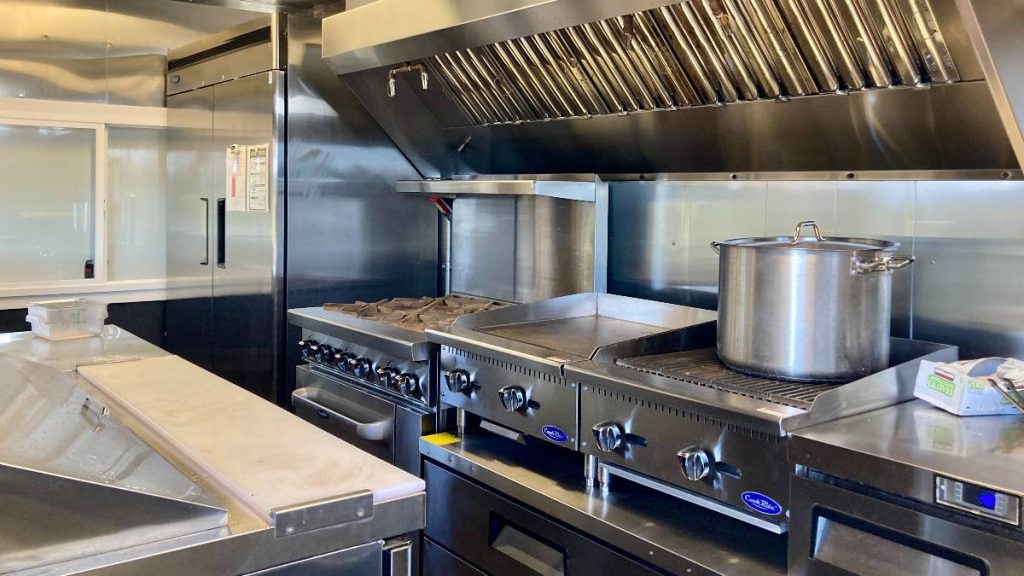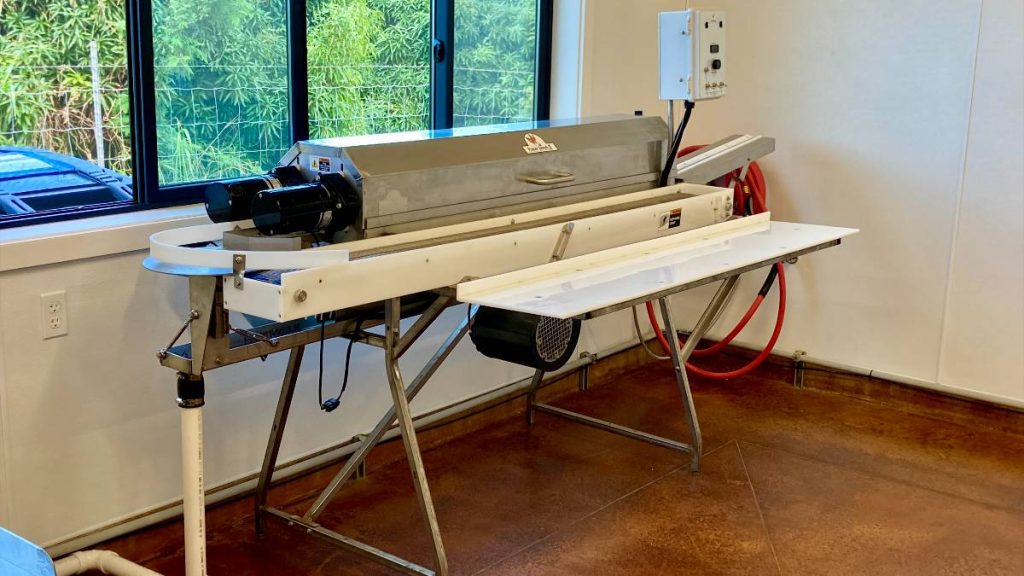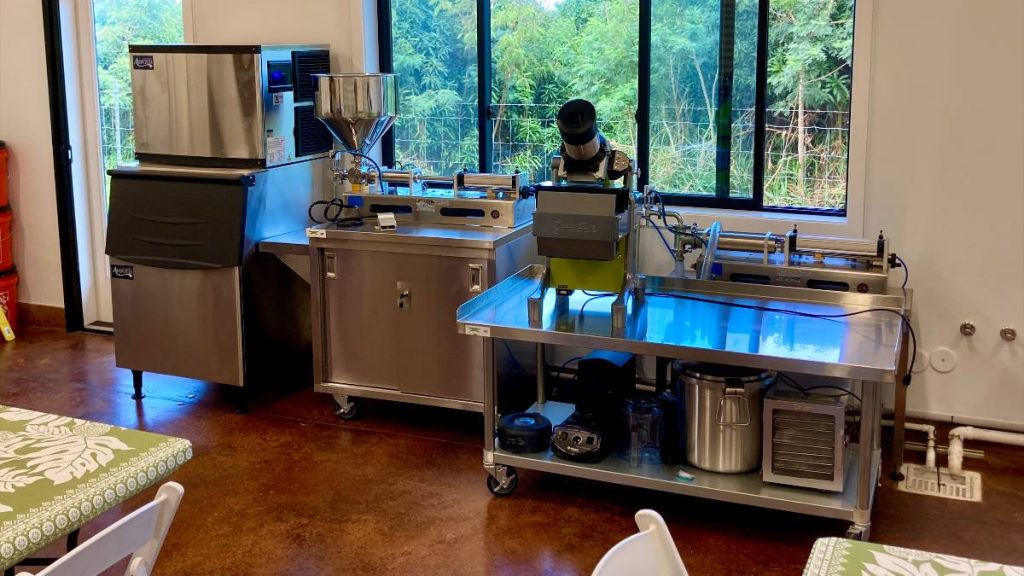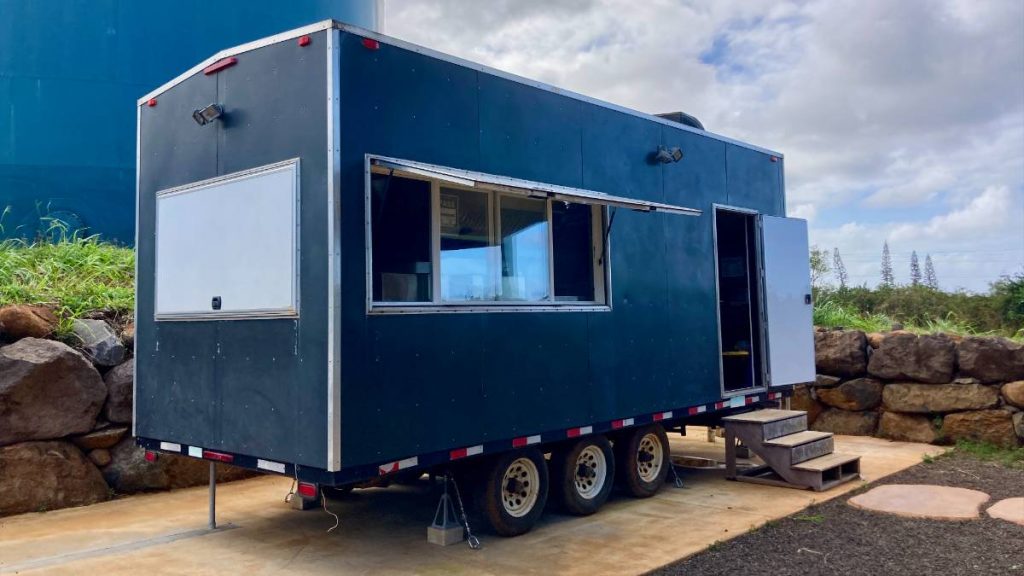Mālama Kaua‘i, Moloa‘a farmers open ʻĀina Center to increase local food production

Kaua‘i moved closer to fulfilling its nickname of the Garden Isle last week, with the grand opening of the $3.2 million ʻĀina Center in Moloa‘a on Feb. 26.
The new food hub – built and run by the local food nonprofit Mālama Kaua‘i – was constructed using state and federal monies, along with private donations. It serves the surrounding Moloa‘a Irrigation Cooperative, a hui of more than 70 farmers tending over 600 acres of land on the island’s North Shore.
Packed with expensive appliances, refrigeration and freezer space, the nearly 3,500-square-foot ʻĀina Center – located off Koʻolau Road beyond the Moloa‘a Sunrise Fruit Stand on Kūhiō Highway – provides the cooperative’s farmers with a precious commercial kitchen.
“It’s going to create a lot more opportunities that have not been there before,” said Christina West, a cooperative member who grows vanilla – widely considered to be one of the most labor-intensive food products in the world – on a small plot five minutes away from the ʻĀina Center.
“We were only focusing on selling straight vanilla beans because in order to create extract and sell it at a retail or wholesale level, we need to be in a kitchen to ensure quality and a good standard for our customers,” West said. “That’s something that hopefully we’re going to be able to offer very soon.”

For Kaua‘i food producers, access to highly regulated commercial kitchens certified by the Hawai‘i Department of Health is hard to come by. Restaurateurs are often unwilling to share their busy workspaces, and community operations with room for new users are rare. Yet the use of a commercial kitchen is vital to the growth of a small farm’s business: It allows for the legal manufacture of value-added products and the preparation of fresh fruits and vegetables. A farmer cannot cut up fruit for sale without a Department of Health permit, according to one Mālama Kaua‘i staff member.
“I grow pineapples … These are perishable things, but if I can make pineapple jam that has a shelf life, I can actually realize more profit,” said farmer Louisa Wooton, the general manager and distribution system operator of the Moloa‘a Irrigation Cooperative. “Value-added products for farmers can be the difference. There’s a razor-thin profit margin in farming. If I can bring that up to a knife edge [I would be happier.]”
The ʻĀina Center has plenty of tools to produce value-added products of all kinds, including a $12,000 egg washer and a $5,000 dehydrator. Other gadgets include a commercial blender, an ice machine, a pressure canner and cooker, a juicer, a bottling station and more. Different equipment for the preparation of hot food can be found in a converted 450-square-foot trailer installed nearby. High-speed internet – a necessity for conducting business effectively – is also available on-site.
“With farming, your yield is always going to be very variable based on the weather, diseases, pests or whatever it may be. When you have something like a value-added product, especially when it’s shelf stable … You have a guaranteed revenue stream,” said Adriana Saggiomo, the farm business development coordinator for Mālama Kaua‘i. “You have this thing in the bank that you know that you can sell and it’s not outside, subject to the elements.”
However, the ʻĀina Center’s $9,000 cold storage units are likely its most important asset. The two walk-in refrigerators and one walk-in freezer will allow Moloa‘a Irrigation Cooperative farmers to preserve unsold produce that would otherwise lose all worth.
“One of our best farmers … grows so much food. But at the end of a farmers market, he brings home so much stuff. He gives a lot of the food away or takes it home and composts it,” Wooton said. “All that work to plant it, cultivate it, fertilize it, water it, everything, if you can’t realize some sort of a return, it’s that razor-thin profit margin.”
Mālama Kaua‘i project manager Rose Hayes believes the impact of the ʻĀina Center, which broke ground in 2020, extends beyond Moloa‘a to promote food security, sustainability and self-sufficiency throughout the entire island.
“[The Garden Isle] is a little bit of a misnomer, because we ship in somewhere between 80 to 90% of our food,” said Hayes. “During the pandemic – and even outside the pandemic, not that long ago, when one of the barges wasn’t running due to a mechanical issue – we started to see shelves be empty.
“We get together, cook together and share meals together in those situations. We know how to take care of ourselves,” continued Hayes, who estimates 300 small-scale commercial farms are currently active on Kaua‘i. “But what we find here is that we can do a better job individually by choosing local and choosing to eat food that’s grown here.”
The ʻĀina (“Agricultural Innovation N’ Acceleration”) Center will also double as Mālama Kaua‘i’s new headquarters, from which it will operate many of its numerous programs. These include its grocery delivery service, farm-to-school initiatives and kūpuna and keiki meal box deliveries.
“Everything we do is coming in and out of here in some way or another,” said Mālama Kaua‘i executive director Megan Fox.
Farmers must complete Department of Health paperwork and receive approval before utilizing the ʻĀina Center, which also charges nominal fees to cover the facility’s maintenance and labor costs.
“I like to say we’re a capacity builder and we’re not here to do all the work. When people ask us for tools, assistance and resources, we try to work with them and go fetch them,” Fox said of the ʻĀina Center. “I really hope that’s what this is, as well. This facility is only going to be as impactful as the farmers who use it.
“My vision is that people do the work, and don’t wait until a pandemic comes or the boat stops coming before they start really thinking about how they want to buy local food every day or every week,” Fox continued. “[I want] farmers feeling supported, that they can increase their production because they have a whole team helping them market and distribute their product. It’s togetherness that’s really important.”
While the ʻĀina Center caters solely to members of the Moloa‘a Irrigation Cooperative, Fox is not opposed to initiating similar enterprises with farmers elsewhere on the island.
“There’s potential for a lot more to be done out there,” she said.
Mālama Kaua‘i is currently hiring paid positions, including several based in the ʻĀina Center. For more information about Mālama Kaua‘i job openings, as well as volunteer opportunities, click here.













